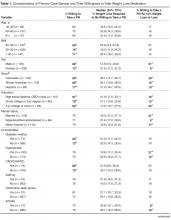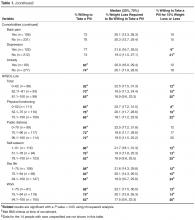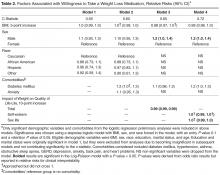Results
Of the 337 subjects enrolled in this study, 331 responded to the question “If your doctor recommended it, would you be willing to take a pill or medication every day in order to lose weight?” Of the respondents, 249 (75%) answered affirmatively. Table 1 characterizes our sample’s willingness to take a weight loss medication and factors significantly associated with willingness to take a weight loss medication prior to adjustment. The median weight loss required by patients ranged from 15% to 24% of body weight depending on the patient subgroup. Only 17% of patients overall were willing to take a medication for 10% weight loss or less (ranged from 6% to 31% depending on subgroup).Table 2 displays sequentially adjusted models examining various demographic, clinical, and QOL factors associated with willingness to take a weight loss medication.
Willingness did not significantly differ by BMI, sex, and race after initial adjustment (model 1). When we considered comorbidities, only diabetes and anxiety were significant correlates; however, the change in C-statistic was negligible. In contrast, overall QOL score (model 3) was significantly associated with willingness to consider pharmacotherapy and improved the model C-statistic from 0.60 to 0.65. When we considered individual QOL domains (model 4), self-esteem and sex life were the only 2 significant domains but together improved the model C-statistics to a greater extent than overall QOL. After adjustment for QOL, men were now significantly more likely than women to consider pharmacotherapy and having a diagnosis of anxiety was no longer a significant correlate.Discussion
In our study, we found that a large proportion (75%) of primary care patients with at least moderate obesity were willing to take a daily weight loss medication if their doctor recommended it. After full adjustment, men, those with lower quality of life (QOL), and patients with diabetes were more likely to pursue weight loss pharmacotherapy than their counterparts. Moreover, QOL appeared more important than comorbid diagnoses in contributing to whether patients would consider taking a weight loss medication. Most patients expected to lose more than 10% of their weight to make taking a daily medication worthwhile.
Few studies have examined patients’ willingness to take a medication to lose weight. Tan et al [11] found that only about half of their surveyed outpatients were likely to take a medication to lose weight; however, approximately a quarter of the patients in that study were of normal BMI. In contrast, our study interviewed patients with at least a BMI of 35 kg/m 2 and the majority of these patients reported a willingness to take a weight loss medication. Nevertheless, patients appear to have unrealistic expectations of the weight loss potential of pharmacotherapy. Only a minority of patients in our study would be willing to take a weight loss medication if the weight loss was no more than 10%, a level that is more consistent with the outcomes achievable in most clinical trials of weight loss medications [12]. Prior studies have also shown that patients often have unrealistic weight loss expectations and are unable to achieve their ideal body weight using diet, exercise, or pharmacotherapy [13,14]. Doyle et al found that percentage of weight loss was the most important treatment attribute when considering weight loss pharmacotherapy when compared to cost, health improvements, side effects, diet and exercise requirements, and method of medication administration [8]. Thus it is important to educate patients on realistic goal setting and the benefits of modest weight loss when considering pharmacotherapy. The weight loss preferences expressed in our study may also influence the weight loss outcomes targets pursued in pharmaceutical development. Interestingly, after full adjustment, BMI did not correlate with willingness to take a weight loss medication. Given that all patients in our study had a BMI of ≥ 35 kg/m 2, this may imply that variations beyond this BMI threshold did not significantly affect a patient’s willingness to use pharmacotherapy. In contrast, weight-related QOL was an important correlate.



